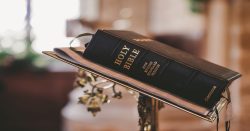John 10:22-23 says:
(22) And it was at Jerusalem the feast of the dedication, and it was winter. (23) And Jesus walked in the temple in Solomon’s porch.
The feast of dedication mentioned in John 10:22 is more commonly referred to as Hanukkah today. The Jewish historian Flavious Josephus in Antiquities of the Jews says it was also referred to as the festival of lights. Some have also referred to it as the feast of renewing or feast of renovation.
John 10:22 is translated from Greek where the Greek word for dedication is tegkainia.┬ĀThe word Hanukkah is the English version of the Hebrew word chanukkah, H2598, translated dedication in Numbers 7:10, 84; 2 Chronicles 7:9; and Nehemiah 12:27.┬Ā These verses in Numbers and 2 Chronicles have to do with dedication of the altar.┬Ā Nehemiah has to do with dedication of the wall of Jerusalem.
Hanukkah or Feast of Dedication like in Numbers and 2 Chronicles has to do with dedication of the altar and the Temple in general.
The feast was instituted during the intertestamental period, the period between Old and New Testaments, that runs from about 420 BC to AD 1. In some traditions this period is called the Deuterocanonical period; in others the 400 silent years.
This feast was instituted by Judas Maccabaeus, in the year 164 BC after he led a group of Jews to retake the city of Jerusalem and the Temple from the pagan Antiochus Epiphanes who had taken it in the year 167 BC.┬Ā During the taking of the city, Antiochus Epiphanes had killed 40,000 inhabitants and sold 40,000 more as slaves. He also sacrificed a female pig on the altar of burnt-offerings sprinkling a broth made from it all over the temple apparently in mockery of the Jews law against eating pigs.
After three years of pagan enemy control, Judas recaptured the city of Jerusalem and the Temple. He purified the Temple from the pollutions and idolatries of Epiphanes, and rededicated the Temple to its purpose in worship of God. In doing so, he pulled down the polluted altar and built a new one.
It is said a miracle occurred in the retaking of the Temple concerning the lampstand or candlestick (Exodus 25:31-40), also known as the menorah.┬Ā The lampstand only had enough olive oil to last one day.┬Ā However, it miraculously lasted eight days.┬Ā This is seen as a sign from God upon his faithfulness and his honoring of the Jews faithfulness.
In memory of this retaking and rededication, Jewish authorities made it a law that each year on the 25th of the ninth Hebrew month an eight days feast is to be held.┬Ā On the Gregorian calendar Hanukkah occurs in November or December depending on the Hebrew year. The timing and purpose of Hanukkah is mentioned in 1 Maccabees 4:59 where it says:
“Moreover Judas and his brethren with the whole congregation of Israel ordained, that the days of the dedication of the altar should be kept in their season from year to year by the space of eight days, from the five and twentieth day of the month Casleu [Kislev], with mirth and gladness.”
Hanukkah is not traditionally a Christian Holiday. However, some Christians do celebrate it.┬Ā
Indeed, it can be a time for special self-examination as to the health of our spiritual temple to ensure we are not defiling or polluting it.┬Ā For 1 Corinthians 3:16-17 says: ┬ĀKnow ye not that ye are the temple of God, and that the Spirit of God dwelleth in you? If any man defile the temple of God, him shall God destroy; for the temple of God is holy, which temple ye are. We can so self examine being mindful of Jesus words in Matthew 15:10-20 where he says that which comes out of the mouth from the health is what defiles a person.┬Ā In considering the temple aspect of Hanukkah, one can be mindful that Hanukkah celebrates the saving of the natural temple. Christmas celebrates the birth of the saviour of the spiritual temple of those who dedicate themselves to Christ.
Hanukkah can be a time for Christians to reflect on and express gratitude for GodŌĆÖs faithfulness and protection in a special way.┬Ā It can also be a time for Christians to reflect on Christ being the light of the world; and to reflect upon and rededicate ourselves to being and projecting the light of Christ onto and into the world.
Hanukkah is not commanded by God in the Bible. As already mentioned it is┬Āa feast established by the Jews in memory of Maccabees retaking of the Temple in the 2nd Century BC.┬Ā
Attempts to justify Hanukkah while denouncing or attempting to not justify Christian holydays such as Christmas and Easter sometimes appeal to Hannukah being mentioned in scripture such as in the book of Numbers as to dedication of the altar as well as in John 10:22. Such attempts also sometimes appeal to Hebrews 11:35 where the mentioning of women being tortured even to the point of death for their commitment to following the laws of God such as dietary and circumcision laws against eating swine as that is seemingly a reference to 1 Maccabees 1:60-61; 2 Maccabees 6:18-19; 7:27-29.┬Ā Such attempts appeal to Matthew 24:15 where Jesus speaks of the abomination of desolation by the prophet Daniel.┬Ā In Daniel 8:13 Daniel indeed does speak of the “transgression of desolation, to give both the sanctuary and the host to be trodden under foot?…Unto two thousand and three hundred days; then shall the sanctuary be cleansed. Though this prophecy is about events similar to the events on which Hanukkah is based, there is a difference of about 3 years before cleansing as Hanukkah was three years and Daniel prophecy is about 6 years. Nevertheless, there is a similarity.
Well certainly Jesus birth as celebrated by Christmas and death and resurrection as celebrated by Easter were prophesied about and their principle mentioned in scripture. And certainly people in the New Testament such as Peter and Paul were killed for their support of the born, crucified, and resurrected Jesus Christ.┬Ā Also, people even since Bible days even unto modern times have been killed for being a Christian, a disciple of the born, crucified, and resurrected Christ.┬Ā Therefore, to assume that the Jewish martyrs of Maccabees times and other times are somehow more honorable than others is a dishonorable assumption amounting to having a respecter of persons of certain nationalities which is a violation of James 2:1.
The fact that man-made feasts such as Hanukkah is mentioned in the Bible does not make such a feast anymore legitimate than feasts made by man beyond bible days.┬Ā If men in Bible days could hold legitimate feasts not commanded by God in the Bible then men beyond Bible days can do the same.┬Ā Though neither Christmas, Easter, nor Hanukkah are commanded by God, they are good and right to do.┬Ā
Anyone failing to observe this truth is either spiritually immature in rightly dividing the word of truth on such matters though not necessarily all matters, or is spiritually and intellectually dishonest only seeking to discredit Christianity at least with respect to its holydays.
Purim is also a Jewish feast mentioned in Esther 9:26 not commanded by God; similar observations apply to Purim concerning its legitimacy. Purim commemorates the deliverance of the Jews from a decree of death by their Persian rules in┬Ā 5th Century BC.┬Ā It is a one day feast that occurs on the 14th day of the Hebrew month of Adar.┬Ā
Any Christian who denounces the legitimacy of Hanukkah or Purim also demonstrate spiritual immaturity in rightly dividing the word of truth on such matters though not necessarily all matters, or is spiritually and intellectually dishonest only seeking to discredit Jewish Christians or at least their holydays.┬Ā
References:
Nazarene Hebrew Institute of Technology (NHIT) Commentary


